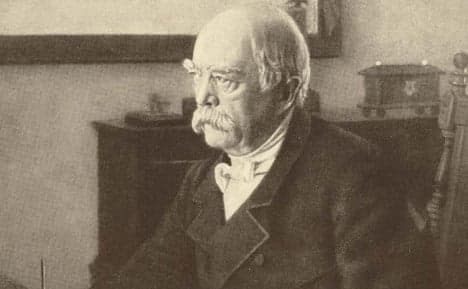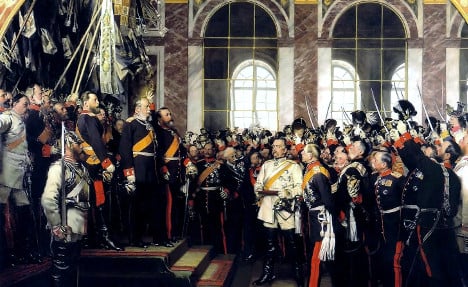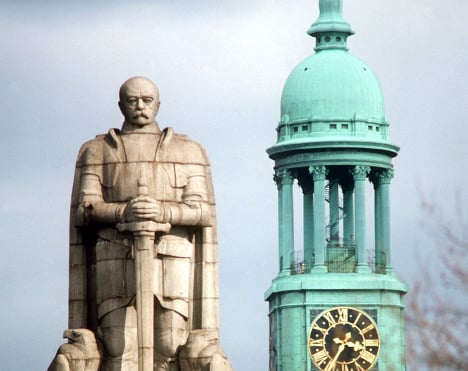Bismarck is Germany's first Chancellor

After forging German nationhood through the Franco-Prussian war in 1871, Otto von Bismarck took office on March 21 as the first German Chancellor - a post he would hold on to for nearly 20 years.
Bismarck divides opinion: for some he is the ultimate exponent of political manoeuvring, for others a war obsessed tyrant, but one thing is certain – he was the original founder of the German state.
As Minister President of Prussia in the 1860s, Bismarck used brief, successful wars against Denmark, Austria and France to rally support for the dominant Prussia from the other smaller states, which would eventually lead to the unification of Germany in 1871.
The most famous of these was the Franco-Prussian War of 1870-1. Bismarck provoked an attack from the French Second Empire, drawing the southern German states into an alliance with the North German Federation (led by Prussia).
The crushing victory over the French became a central factor in uniting the northern and southern states into the German nation-state in 1871.
Bismarck himself came from the Prussian Junker noble class, which meant his background was aristocratic, traditional and oriented towards military glory.

Iron Chancellor
The Local spoke to Prof. Ulrich Lappenküper, chairman of the Otto von Bismarck Foundation, who shared some of his expertise on the Iron Chancellor.
He said that a lot is uncertain when looking at Bismarck, with some modern historians even questioning his importance in shaping history.
One undisputed fact is that after becoming Chancellor of the newly united state in 1871, Bismarck managed to maintain a period of peace and stability in Europe through his incredible diplomatic skills.
The chaos that followed his forced resignation in 1890 is testament to the role he played in steering the continent through tense times.
Wilhelm II's foreign policy became much more reckless after he lost the man who had made his grandfather Emperor (Kaiser) of all the Germans - and the decision may have contributed to the outbreak of the First World War.
Even close to his end in 1898, Bismarck could see that without him the Empire was heading for calamity.
"Jena [the Prussians' great defeat at the hands of Napoleon] came twenty years after the death of Frederick the Great; the crash will come twenty years after my departure if things go on like this," he said.
In the event, he was just a few months out.
Man of contradictions
Despite his formidable skills, Dr. Lappenküper questioned whether they would be suitable for the complex crises going on in Europe today.
And his time in power shows how he was a "leader of many contradictions", as Dr. Lappenküper described him.
While Bismarck was the first leader to introduce social security laws in the 1880s, he didn't do so out of a sense of moral obligation, but the hope to boost his country's economic growth with healthier, happier workers.
He conducted a diplomatic campaign against the Catholic Church, hoping to have European leaders agree among themselves on suitable candidates for Pope in a revival of fears of excessive papal power.
And he was notorious for oppressing minorities within the new German state, including Danes in the north, French in Alsace-Lorraine and Poles in the east.
1848 vs. 1871
"The great questions of the day will not be settled by means of speeches and majority decisions but by iron and blood," Bismarck said in perhaps his most famous pronouncement, referring to the failed revolutions of 1848.
He rejected the liberalism and egalitarian ideals that were originally associated with the push towards a German nation state before 1848, and which were exemplified in the black, red and gold flag used by the revolutionaries - which would later become the flag of the German nation.
Instead he tied the concept of the German nation with war, power and conservatism.

The idealism of the Frankfurt Parliament and the 1848 revolutions were erased by his pragmatism and conservation of power, often known as realpolitik – no overarching political beliefs, but instead pure opportunism for self-interested ends.
Complex Legacy
Bismarck's legacy remains a topic for debate today, and Dr. Lappenküper said he strongly disagreed with the idea that Bismarck paved the way for the Third Reich.
There is a stream of thought among German historians who depict Bismarck as "Dämon der Deutschen" (the demon of the Germans), but Lappenküper dismissed this myth as "nonsense"
Although similarities can be drawn between Bismarck and Hitler, such as their common disdain for socialism, Lappenküper doesn’t accept anything more concrete.
"There were too many decisions made and too many different possibilities in the intervening period for any firm links to be established," he said.
Comments
See Also
Bismarck divides opinion: for some he is the ultimate exponent of political manoeuvring, for others a war obsessed tyrant, but one thing is certain – he was the original founder of the German state.
As Minister President of Prussia in the 1860s, Bismarck used brief, successful wars against Denmark, Austria and France to rally support for the dominant Prussia from the other smaller states, which would eventually lead to the unification of Germany in 1871.
The most famous of these was the Franco-Prussian War of 1870-1. Bismarck provoked an attack from the French Second Empire, drawing the southern German states into an alliance with the North German Federation (led by Prussia).
The crushing victory over the French became a central factor in uniting the northern and southern states into the German nation-state in 1871.
Bismarck himself came from the Prussian Junker noble class, which meant his background was aristocratic, traditional and oriented towards military glory.

Iron Chancellor
The Local spoke to Prof. Ulrich Lappenküper, chairman of the Otto von Bismarck Foundation, who shared some of his expertise on the Iron Chancellor.
He said that a lot is uncertain when looking at Bismarck, with some modern historians even questioning his importance in shaping history.
One undisputed fact is that after becoming Chancellor of the newly united state in 1871, Bismarck managed to maintain a period of peace and stability in Europe through his incredible diplomatic skills.
The chaos that followed his forced resignation in 1890 is testament to the role he played in steering the continent through tense times.
Wilhelm II's foreign policy became much more reckless after he lost the man who had made his grandfather Emperor (Kaiser) of all the Germans - and the decision may have contributed to the outbreak of the First World War.
Even close to his end in 1898, Bismarck could see that without him the Empire was heading for calamity.
"Jena [the Prussians' great defeat at the hands of Napoleon] came twenty years after the death of Frederick the Great; the crash will come twenty years after my departure if things go on like this," he said.
In the event, he was just a few months out.
Man of contradictions
Despite his formidable skills, Dr. Lappenküper questioned whether they would be suitable for the complex crises going on in Europe today.
And his time in power shows how he was a "leader of many contradictions", as Dr. Lappenküper described him.
While Bismarck was the first leader to introduce social security laws in the 1880s, he didn't do so out of a sense of moral obligation, but the hope to boost his country's economic growth with healthier, happier workers.
He conducted a diplomatic campaign against the Catholic Church, hoping to have European leaders agree among themselves on suitable candidates for Pope in a revival of fears of excessive papal power.
And he was notorious for oppressing minorities within the new German state, including Danes in the north, French in Alsace-Lorraine and Poles in the east.
1848 vs. 1871
"The great questions of the day will not be settled by means of speeches and majority decisions but by iron and blood," Bismarck said in perhaps his most famous pronouncement, referring to the failed revolutions of 1848.
He rejected the liberalism and egalitarian ideals that were originally associated with the push towards a German nation state before 1848, and which were exemplified in the black, red and gold flag used by the revolutionaries - which would later become the flag of the German nation.
Instead he tied the concept of the German nation with war, power and conservatism.

The idealism of the Frankfurt Parliament and the 1848 revolutions were erased by his pragmatism and conservation of power, often known as realpolitik – no overarching political beliefs, but instead pure opportunism for self-interested ends.
Complex Legacy
Bismarck's legacy remains a topic for debate today, and Dr. Lappenküper said he strongly disagreed with the idea that Bismarck paved the way for the Third Reich.
There is a stream of thought among German historians who depict Bismarck as "Dämon der Deutschen" (the demon of the Germans), but Lappenküper dismissed this myth as "nonsense"
Although similarities can be drawn between Bismarck and Hitler, such as their common disdain for socialism, Lappenküper doesn’t accept anything more concrete.
"There were too many decisions made and too many different possibilities in the intervening period for any firm links to be established," he said.
Join the conversation in our comments section below. Share your own views and experience and if you have a question or suggestion for our journalists then email us at [email protected].
Please keep comments civil, constructive and on topic – and make sure to read our terms of use before getting involved.
Please log in here to leave a comment.